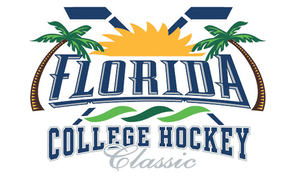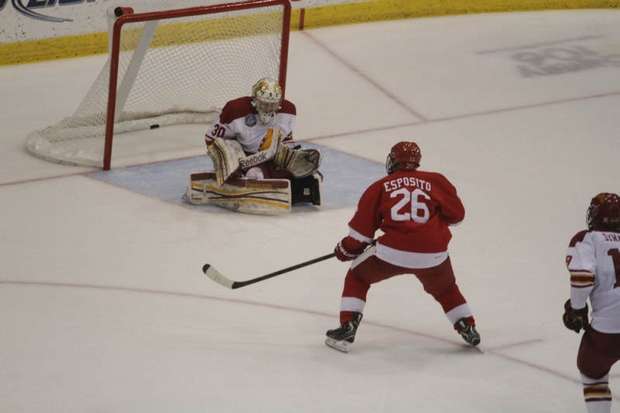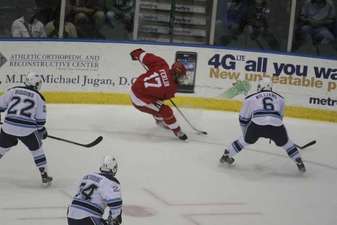Maine's offense ranks only better than that of the constant road warrior Chargers of Alabama-Huntsville. Maine's defense ranks 30th in the nation to Cornell's current placement at 15th in the nation in terms of goals allowed per game. Maine's power-play unit converts less than 9.0% of the time. The one team category of importance in which Maine still holds an advantage over Cornell after the 6-4 loss is penalty killing. Maine kills 85.0% of its penalties while Cornell prevents its opponents from converting on the power play only 80.4% of the time.
Despite the disappointment of the loss, several key positive emerged from the weekend series in Ferlin's home state. Cornell's scoring opened the weekend with the Floridian celebrating his homecoming of sorts. Ferlin would score two goals in the opening clash against the Ferris State Bulldogs which leaves one to wonder what if he had played in the 2012 NCAA Midwest Regional Final. Would Ferlin have solved Ferris State's senior netminder Taylor Nelson in the crucial minutes of that game?
Ferlin's performance remained stellar over the weekend with adding three points over both games. Ferlin left the game early on Saturday when he took a facemasking penalty that resulted in his earning of a game misconduct. Ferlin's game misconduct coupled with Lowry's 10-minute misconduct earlier in the game allowed Maine to enjoy nearly 33 minutes of game play with at least one of Cornell's top-six scorers off the ice.
The offense was not lacking even in the game against Maine. Cornell produced four goals on just 29 shots. This was just over 24 hours removed from when Cornell scored five goals against its CCHA foe on 30 shots. Five goals is the most that Ferris State has allowed all season.
Cornell's offense heated up in the Florida sun. Cornell scored more than four goals in consecutive games for the first time this season. Cornell has not scored fewer than three goals in its last five games including games against Michigan, Ferris State, and Maine when the Big Red scored four or more. McCarron began the second half of the season much like he did last season by opening his scoring in the second half. He scored twice against the invited Bulldogs from his home state in the Florida College Hockey Classic's opening game.
Ferlin and McCarron joined the ranks of scorers this past weekend while leading contributors like Miller and Esposito maintained their constant rate of production. Miller showed equal opportunity scoring when he struck against both the CCHA's Bulldogs and Hockey East's Black Bears. Miller had four points on the weekend. Miller currently produces one point per game while Esposito is eighth in the nation in terms of offensive goal production with 0.64 goals per game.
Cornell's senior captains were not to be outdone as Axell tallied three points over both games with goals against both Maine and Ferris State. D'Agostino produced four points for Cornell this last weekend.
What went wrong? The apparent flaw over the weekend despite the gaudy offensive numbers that Cornell notched against opponents from major college hockey conferences was ill-advised penalties when Andy Iles was having an average, but not stellar as Cornell has grown to expect from him, game. The two factors combined to overwhelm even one of the most prolific outbursts of Big Red offense in recent memory.
The latter noted problem is manifested in the fact that Cornell now has the dubious honor of being fourth in the nation in terms of penalty minutes per game. It is difficult for even the best of teams and goaltenders to deliver results when it is killing penalties and some of its leading scorers are off the ice and unable to overcome any greater-than-expected challenges behind the blue line. Cornell was given 52 minutes of penalties to its opponents's 28 minutes of penalties in the 2012 Florida College Hockey Classic.
This is not to point fingers. The purpose is to highlight that with increased discipline that this team is still on-track offensively. Furthermore, anyone who worries about Andy Iles misunderstands his history. He is a goaltender who finds the ability to deliver the performances that his team needs to win the most important and high-stakes games. He will continue to do that throughout this season. Additionally, Schafer will ensure the this Cornell team becomes more disciplined in terms of penalties.
Even though the Maine loss was unexpected and arguably embarrassing, two things must be considered. Firstly, Maine does not even own a winning percentage of 0.300. The Black Bears outrank only Alabama-Huntsville and Sacred Heart in terms of winning percentage. This makes the loss seem somewhat more insulting, however, in terms of post-season relevance, it is highly unlikely that the Black Bears will claw their way into team-under-consideration territory wherein the loss for Cornell could hurt Cornell's post-season ambitions.
Secondly, Cornell's history in the 13-year old Florida College Hockey Classic should put most angst to rest. Cornell won the Ned Harkness Cup in 2003, 2005, and 2008. Do the years 2004, 2006, and 2009 resonate with the Lynah Faithful?
The 2003-04 season was a season of few accolades. That season Cornell's major achievement was to win a share of the Ivy-League title. That season Cornell shared the Ivy-League title with Brown; a deflationary distinction if there is such a thing for a championship.
The 2005-06 and 2008-09 seasons are memorable not for their accomplishments, but for their near-misses. Little elaboration is needed because each is readily identifiable as a season of a specific game. Cornell's 2005-06 season will be known forever as the season of the Wisconsin game. The 2008-09 season will be more infamously and painfully remembered as the season of the Bemidji State game.
What's the point of this? Cornell has won three Whitelaw Cups since the Florida College Hockey Classic began in 2000. The Big Red has not won a single Ned Harkness Cup from the Florida College Hockey Classic en route to claiming an ECAC title. The 2002-03 team that earned the Big Red's only berth to the Frozen Four in the Schafer Era did not capture the Ned Harkness Cup. The now legendary 2003 Cornell team dropped games to both Maine and Ohio State in Estero, FL. Cornell has a record of 1-5-0 in the Florida College Hockey Classic in ECAC Championship-winning seasons.
The 2012-13 Cornell Big Red team is in very good and very successful company with not leaving Florida with a trophy. The Maine result may be disappointing, but in historical context, one might think of the Florida College Hockey Classic as more important to Cornell teams as a lesson about how to win weekend championship series rather than a goal in itself. Freshmen who are wearers of the carnelian and white for the first time like Hilbrich, Knisley, Tiitinen, and Willcox, all of whom saw ice time in Florida, now are more familiar with what effort it takes to win a neutral site tournament in college hockey. These freshmen will be key to ultimate season success and hopefully the lesson that they learned in Florida will be invaluable in the 2012-13 post-season.






 RSS Feed
RSS Feed
